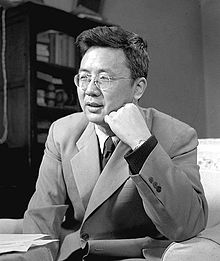
Back هوا لوجينج ARZ هوآ لووکنق AZB ཧྭ་ལུའོ་ཀེང་། Tibetan Hua Luogeng Catalan Chua Luo-keng Czech Hua Luogeng German Hua Luogeng Spanish هوآ لووکنگ Persian Hua Luogeng French 華羅庚 Japanese
This article includes a list of general references, but it lacks sufficient corresponding inline citations. (February 2017) |
Hua Luogeng | |||||||||||||
|---|---|---|---|---|---|---|---|---|---|---|---|---|---|
 Hua Luogeng in 1956 | |||||||||||||
| Born | 12 November 1910 | ||||||||||||
| Died | 12 June 1985 (aged 74) | ||||||||||||
| Nationality | Chinese | ||||||||||||
| Known for | Hua's inequality Brauer–Cartan–Hua theorem Hua's lemma Hua's identity Hua's identity (Jordan algebra) | ||||||||||||
| Office | Vice Chairperson of the Chinese People's Political Consultative Conference | ||||||||||||
| Political party | Chinese Communist Party | ||||||||||||
| Academic background | |||||||||||||
| Education | six years of primary school and three years of secondary school | ||||||||||||
| Academic work | |||||||||||||
| Discipline | Mathematics | ||||||||||||
| Doctoral students | Chen Jingrun Pan Chengdong Wang Yuan | ||||||||||||
| Chinese name | |||||||||||||
| Simplified Chinese | 华罗庚 | ||||||||||||
| Traditional Chinese | 華羅庚 | ||||||||||||
| |||||||||||||
Hua Luogeng or Hua Loo-Keng (Chinese: 华罗庚; Wade–Giles: Hua Lo-keng; 12 November 1910 – 12 June 1985) was a Chinese mathematician and politician famous for his important contributions to number theory and for his role as the leader of mathematics research and education in the People's Republic of China. He was largely responsible for identifying and nurturing the renowned mathematician Chen Jingrun who proved Chen's theorem, the best known result on the Goldbach conjecture. In addition, Hua's later work on mathematical optimization and operations research made an enormous impact on China's economy. He was elected a foreign associate of the US National Academy of Sciences in 1982.[1] He was elected a member of the standing Committee of the first to sixth National people's Congress, Vice-chairman of the sixth National Committee of the Chinese People's Political Consultative Conference (April 1985) and vice-chairman of the China Democratic League (1979). He joined the Chinese Communist Party in 1979.
Hua did not receive a formal university education. Although awarded several honorary PhDs, he never got a formal degree from any university. In fact, his formal education only consisted of six years of primary school and three years of secondary school. For that reason, Xiong Qinglai, after reading one of Hua's early papers, was amazed by Hua's mathematical talent, and in 1931 Xiong invited him to study mathematics at Tsinghua University
- ^ Wang, Yuan (1991), "Hua Loo Keng: A Brief Outline of his Life and Works", International Symposium in Memory of Hua Loo Keng, Springer Berlin Heidelberg, pp. 1–14, doi:10.1007/978-3-662-07981-2_1, ISBN 9783662079836